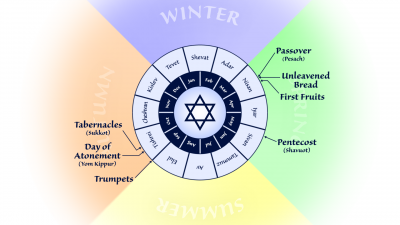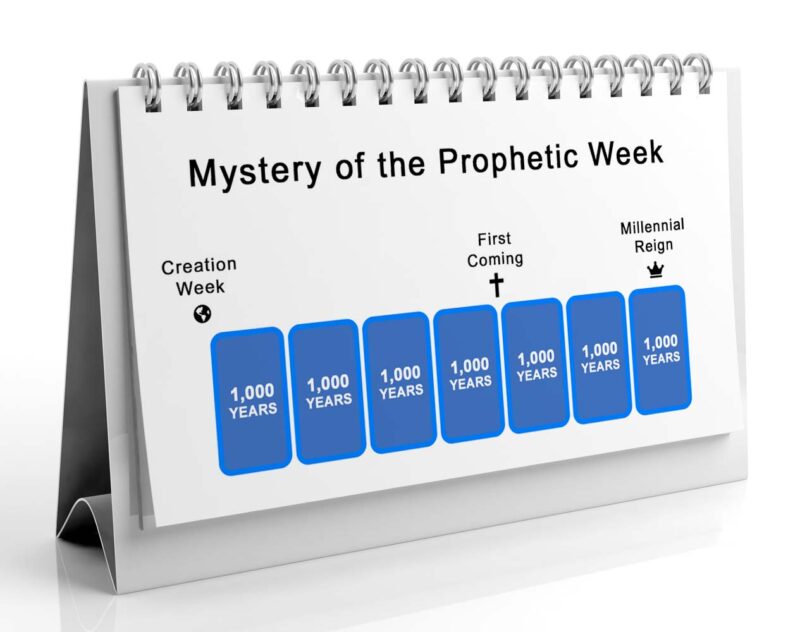In the beginning, God created time. Time is a part of this universe, and just like everything else that God created, it is full of patterns — a perfect blend of complexity and simplicity. All the patterns in time are woven together to create God’s prophetic storyline of history and redemption.
 In our video The Prophetic Fulfillment of the Biblical Feasts, we describe the seven appointed times that God gave His people: four in the spring that correspond perfectly with the first coming of Jesus, and three in the fall that foreshadow His second coming.
In our video The Prophetic Fulfillment of the Biblical Feasts, we describe the seven appointed times that God gave His people: four in the spring that correspond perfectly with the first coming of Jesus, and three in the fall that foreshadow His second coming.
The biblical year is a pattern for the whole of human history. You have the period leading up to the springtime arrival of Jesus, then a summer of “working in the fields” to spread the Gospel, which is the time we’re in now, followed by His return in the fall to conclude the harvest and begin the Feast of Tabernacles — God dwelling with us.
Today, we’re going to look at an even earlier and more fundamental pattern of human history, which God established at the very beginning.
Creation Week
In God’s plan, all of history centers around the Messiah. From the book of Ephesians, we read:
“In all wisdom and insight, He made known to us the mystery of His will, in keeping with His good pleasure that He planned in Messiah. The plan of the fullness of times is to bring all things together in the Messiah—both things in heaven and things on earth, all in Him.” Ephesians 1:8-10 (TLV)
The timeline of history is made up of increments of time — days, weeks, months, years, millennia — and God has built some really interesting patterns in time that all point to the Messiah. Take creation week for example: we know that God created all things in six days and then rested on the 7th day.
“Thus the heavens and the earth were completed, and all their hosts. By the seventh day God completed His work which He had done, and He rested on the seventh day from all His work which He had done. Then God blessed the seventh day and sanctified it, because in it He rested from all His work which God had created and made.” Genesis 2:1-3 (NASB)
Paul tells us in Colossians 2:16-17 that the sabbath day is a mere shadow of what is to come, and “the substance belongs to Christ.”
So what is the “substance” that the weekly sabbath is a shadow of?
Maybe you’ve heard of the millennial reign of Messiah that is to come. It will be a 1,000-year period following His second coming, during which He will rule on earth as King of kings and Lord of lords.
It’s easy to see how Messiah’s millennial reign will be a sabbath age that fulfills the foreshadowing of the weekly day of rest. And if that 1,000-year period is equivalent to the seventh day of a week, what does that imply about the “days” preceding it?
When a Day is More Than a Day
There are other hints in Scripture that make the same implication. For example, we read in Hosea:
“After two days He will revive us. On the third day He will raise us up,
and we will live in His presence. So let us know, let us strive to know Adonai.”
Hosea 6:2-3 (TLV)
This prophecy indicates that God’s people will be raised up following the same pattern as the resurrection of Jesus himself, “On the third day.” But this obviously does not refer to literal 24-hour days. One interpretation is that the third day is the sabbath age, the millennial reign of Messiah, which we know will be the time when “we will live in His presence.” And if the third day is 1,000 years, it makes sense to see the two preceding days as two millennia.
By this time, you may be thinking of 2 Peter 3:8:
“But do not let this one fact escape your notice, beloved, that with the Lord one day is like a thousand years, and a thousand years like one day.” 2 Peter 3:8 (NASB)
This verse is the biggest hint the Bible gives when it comes to understanding human history as a week of millennia. Based on this premise, and what we know of history so far, here is how the seven “days” add up:
- Messiah’s first coming was about 4,000 years after creation.
- It has been nearly 2,000 years since Messiah’s death and resurrection.
- Messiah’s millennial reign will be 1,000 years.

According to this timeline, we are very close to Messiah’s second coming — although on a scale of millennia, “very close” may still be many decades.
By the Numbers
In addition to the passages mentioned above, there are a couple more biblical patterns that correlate with this idea.
The number seven is prominent throughout Scripture as the number of perfection, completeness, and sufficiency. Seven days was just the right amount of time for God’s work of creation, including a day to enjoy its completion. Perhaps seven millennia is just the right amount of time for God’s work of redemption, including a millennia to enjoy its completion.
While seven is the number of perfection, six is just short of it—the number of imperfection. Man was created on the sixth day, and it is plausible that man may be given 6,000 years to rule imperfectly over God’s creation before Jesus returns to establish His perfect rule in the seventh millennium.
Conclusion
The idea we have presented in this article is not a matter of primary or even secondary doctrine. It cannot be proven from Scripture beyond a shadow of a doubt. It is only an interesting pattern, which time will confirm or disprove. But we thought this mental exercise was worth pondering together.
Whether or not this theory turns out to be accurate, the important thing is to keep our attention focused on our Lord and our hearts longing for His return. He is the Alpha and Omega, the beginning and the end, and God’s story starts and ends with Him.
“The plan of the fullness of times is to bring all things together in the Messiah—both things in heaven and things on earth, all in Him.” Ephesians 1:10 (TLV)
We are living in the End Times, but how close to the end of the end are we? If history is truly a week of millennia, then we don’t have to wait long to find out.





